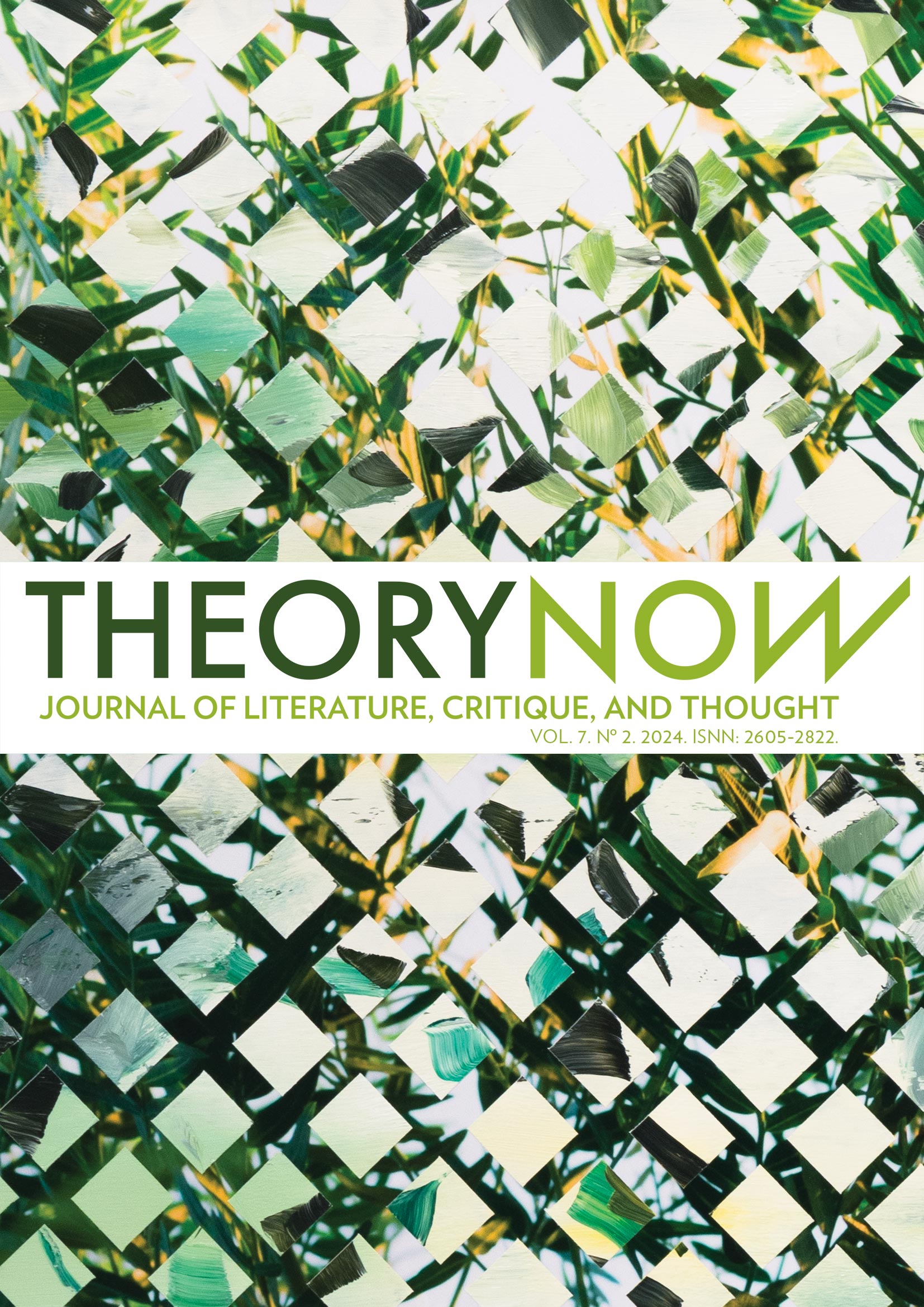Convertirse en una maceta: Una aproximación desde los plant studies al cuento de Han Kang “El fruto de mi mujer”
DOI:
https://doi.org/10.30827/tn.v7i2.29560Palabras clave:
Estudios sobre plantas, movilidad de las plantas, inteligencia, comunicación, antropomorfismo, concepción del ser humano, Han KangResumen
Resumen: Los plant studies, una rama reciente de los estudios culturales, examinan el estatus ontológico de las plantas y redefinen, implícita y explícitamente, el estatus del ser humano dentro de la red más amplia de la vida. Los científicos han descubierto que las plantas no son simplemente objetos pasivos, sino agentes activos con capacidades sorprendentes: son móviles e intencionales, capaces de tomar decisiones inteligentes, de comunicarse entre sí y con su entorno, son un “quién y no solo un qué” (Michael Marder). Este artículo analiza estas afirmaciones clave de los plant studies y argumenta que el uso de términos antropomórficos para describir las capacidades recientemente descubiertas de las plantas es una elección filosófica con serias consecuencias para nuestra comprensión no solo del mundo vegetal, sino también de nuestra posición en él. Esto nos permite ir más allá de nuestra actitud jerárquica y zoocéntrica y entendernos como parte de una red de relaciones más amplia. El artículo demuestra el papel de los plant studies en los estudios literarios a través de la interpretación del cuento “El fruto de mi mujer” de Han Kang.
Descargas
Citas
Bose, Ananya. "Becoming Vegetarian: Reading Han Kang's the vegetarian and the fruit of my woman". International Journal of Applied Research, 3 (7), 2017, pp. 63-66. https://www.allresearchjournal.com/archives/2017/vol3issue7/PartA/7-2-55-393.pdf
Derrida, Jacques. The Animal that Therefore I Am, edited by Marie-Louise Mallet, translated by David Wills, New York, Fordham University Press, 2008.
Finck, Shannon. "Clenched and Empty Fists: Trauma and Resistance Ethics in Han Kang's Fiction". Humanities, vol. 11, no. 6, 2022. https://www.tandfonline.com/doi/full/10.1080/00111619.2020.1713716
Gagliano, Monica; John C. Ryan; and Patrícia Vieira. "Introduction". The Language of Plants: Science, Philosophy, Literature, edited by Monica Gagliano; John C. Ryan; and Patrícia Vieira, Minneapolis, University of Minnesota Press, 2017, pp. vii-xxxiii.
Gibson, Prudence. The Plant Contract: Art’s Return to Vegetal Life. Leiden, Brill, 2018.
Hall, Matthew. Plants as Persons: A Philosophical Botany. Albany, SUNY, 2011.
Haraway, Donna. The Companion Species Manifesto: Dogs, People, and Significant Otherness. Chicago, Prickly Paradigm Press, 2003.
____. When Species Meet. Minneapolis, University of Minnesota Press, 2008.
Kang, Han. The Vegetarian. London, Portobello Books, 2015.
____. "The Fruit of My Woman". Granta Magazine, 19 Nov 2019, pp. 1-14. https://granta.com/the-fruit-of-my-woman/ 19 Nov 2019.
Kim, Mijeong. "A Deleuzian Reading of 'Becoming-plant' in Han Kang's Writing: 'The Fruit of My Woman' and The Vegetarian", pp. 327-340. https://www.mdpi.com/2076-0787/11/6/149 04 Jun 2024
Klein, Stefan. "Der IQ der Sonnenblume". DIE ZEIT, 22 Mar 2018, pp. 19-25.
Laist, Randy, editor. Plants and Literature: Essays in Critical Plant Studies. Netherlands, Editions Rodopi, 2013.
Marder, Michael. "If Peas Can Talk Should We Eat Them?". The Stone, 28 Apr 2012, np.
____. Plant-Thinking: A Philosophy of Vegetal Life. New York, Columbia University Press, 2013.
McGowan, Kat. "The Secret Language of Plants". Quanta Magazine, 16 Dec 2013, https://www.quantamagazine.org/the-secret-language-of-plants-20131216/ 04 Jun 2024
Nagel, Thomas. “What Is It Like to Be a Bat?” The Philosophical Review, vol. 83, no. 4, 1974, pp. 435-45.
Patrick, Bethann. "Han Kang on Violence, Beauty, and the (Im)possibility of Innocence". Literary Hub, 12 February 2016, https://lithub.com/han-kang-on-violence-beauty-and-the-impossibility-of-innocence/ 22 Jun 2023.
Pollan, Michael. The Botany of Desire: A Plant's-Eye View of the World. New York, Random House, 2001.
____. "The Intelligent Plant". The New Yorker, 23 & 30 Dec 2013, pp. 92-105.
Regan, Tom. The Case for Animal Rights. 1983. Berkeley, University of California Press, 2004.
Ryan, John Charles. "Passive Flora? Reconsidering Nature's Agency through Human-Plant Studies (HPS)". Societies, 14 Aug 2012, np.
Sandilands, Cate. "'It Was the Flowers on His Body': Discomfort, Desire, and Vegetability in The Vegetarian”. Sex Ecologies, edited by Stefanie Hessler and Katja Aglert, Cambridge, MIT Press, 2021, p. 2.
Singer, Peter. Animal Liberation. London, Bodley Head, 2015.
Smith, Deborah. "Translator's Note". Granta Magazine, 19 Nov 2019, pp. 13-14, https://granta.com/the-fruit-of-my-woman/ 19 Nov 2019.
Stark, Hannah. "Deleuze and Critical Plant Studies". Deleuze and the Non/Human, edited by Jon Roffe and Hannah Stark, New York, Palgrave Macmillan, 2015, pp. 180-196.
Taylor, Luke. "Doubts over the Wood Wide Web". New Scientist, 18 Feb 2023, p. 10.
Tompkin, Peter and Christopher Bird. The Secret Life of Plants. New York, Harper & Row, 1973.
Wohlleben, Peter. The Hidden Life of Trees: What They Feel, How They Communicate—Discoveries from A Secret World. Vancouver, Greystone Books, 2016.
Descargas
Publicado
Cómo citar
Número
Sección
Licencia
Theory Now Journal of Literature, Critique, and Thought es una publicación de acceso abierto e inmediato totalmente gratuita, tanto para lectorxs como para autorxs. Lxs autorxs no pagan ningún tipo de tasa por el proceso editorial de sus artículos. Permitimos la lectura, descarga, copia, distribución, impresión, búsqueda, enlace o reutilización con fines no comerciales de todos los trabajos publicados, siempre que se citen la autoría, la revista y el órgano editor. Todo material intelectual publicado en esta revista se encuentra protegido con una licencia de Creative Commons Reconocimiento-NoComercial .
Recomendamos encarecidamente la difusión de los artículos en redes sociales (Facebook, Twitter, LinkedIn, etc.) y científicas (ResearchGate, Academia.edu, etc.), repositorios institucionales universitarios y otros repositorios públicos, blogs y webs personales o institucionales, Google Scholar, ORCID, ResearchID, ScopusID, etc. En cualquier caso, la propiedad intelectual de los artículos y los posibles derechos económicos derivados de ellos son exclusivamente de sus autores.













